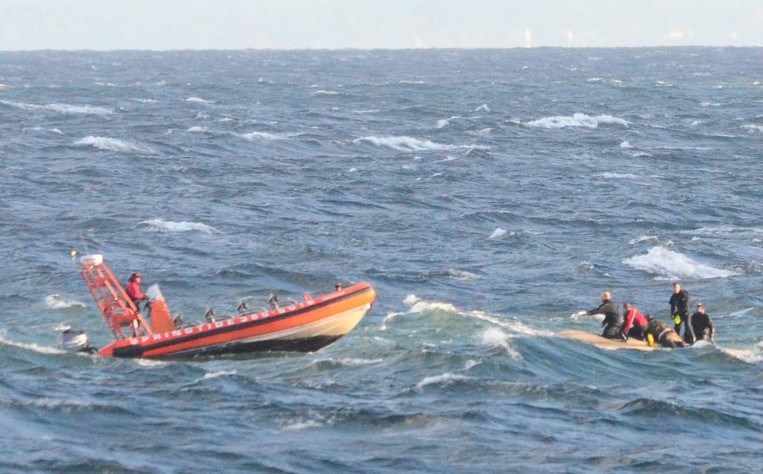UPDATED: Two volunteer rescue crews, one from Victoria and the other from Sooke, improvised a tag-team-style effort to pluck nine stricken scuba divers off a bouncing, capsized boat Sunday afternoon.
Jason van der Valk, coxswain of the Royal Canadian Marine Search and Rescue craft based in Sooke, said his crew started the rescue by throwing a line to the boat capsized near Race Rocks, and pulling first one, then two divers to safety from the water.
The Sooke boat then moved aside while its crew checked out the medical condition of the two rescued divers. Meanwhile, the Victoria boat moved in and repeated the heaving-line rescue for one more diver. Then, it was the Sooke boat’s turn again.
The strategy was repeated until all nine recreational divers had been pulled to safety. They were taken to Pedder Bay Marina, where ambulances and helicopters were waiting. None suffered anything worse than mild hypothermia and seasickness.
Van der Valk said the dual-team rescue had never been rehearsed or tried before. But after countless hours of drills and hard training, rescue crews learn to put together best procedures on the spur of the moment.
“That’s the first time,” he said in a telephone interview. “But just knowing how everybody is going to operate it just went like clockwork.”
All nine rescued divers are members of a recreational diving club called the Aquarius Dive Club, based at CFB Esquimalt. Eight were wearing cold-water drysuits. One person, the boat driver, was without a dive suit.
Sara Helmeczi, acting spokeswoman for CFB Esquimalt, said the Aquarius Club is for service men and women and associated members from the public. It is not a military body.
Helmeczi said when the divers arrived at Race Rocks on Sunday, they decided it was too rough and tried to head elsewhere, but were swamped by waves.
She said four of the nine divers rescued on Sunday are military personnel, so the Canadian Armed Forces will conduct a safety investigation into the incident.
Van der Valk said the first call came in about 2 p.m. on Sunday, saying there were five people in a capsized boat near Race Rocks.
“We didn’t know much detail at first,” said van der Valk. “But they never like to delay, so it was just ‘Go! Go! Go!’ ”
He said Race Rocks, near the eastern entrance to the Strait of Juan de Fuca, is midway between Sooke and Victoria stations, so both responded in their Zodiac-style jet boats, Sooke with a crew of six and Victoria with five.
Van der Valk said the waves were four to six feet high at Race Rocks. When rescuers arrived at the scene, they could see four people in the water clinging to the boat and five sitting on top of the overturned hull. He estimated they had been in the water for 45 minutes to an hour.
“The waves were breaking over the boat and quite frankly I’m amazed they were able to hang on,” said van der Valk. “I’m surprised one of them hadn’t let go or fallen off and drifted away.
“Given the state of the sea, there is no way they could have swum back to the boat.”
Waiting nearby was a whale-watching boat, the Spring Tide, which had temporarily set its passengers on Race Rocks and stood by to help, if needed. A recreational fishing boat was also standing by.
But van der Valk said the two rescue craft have a special low ramp at the stern, making it easy to pull tired people from the water. As jet boats, they also have no propellors to cut feet treading water.
Don Macisaac, eco-guardian of Race Rocks, said his fellow guardian and fiancée, Nina Yousefpour, noticed the dive boat, which was initially upright, while doing chores. The two live full time on Race Rocks.
A short while later, the two saw the overturned boat with people waving, attempting to attract attention.
Macisaac said Yousefpour helped co-ordinate some of the emergency radio communication, including to fire officials assisting with ambulances at Pedder Bay. Meanwhile, Macisaac helped the Spring Tide unload its passengers and push back off.
Race Rocks, an ecological reserve managed by Pearson College, is normally off limits to the public.
Macisaac said the ocean temperature is about 9.7 C. “If they hadn’t been wearing wetsuits they would have been in a lot of trouble.”
This is the second emergency at Race Rocks in the last few months.
On July 5, Timothy Chu, a 27-year-old British police officer, became separated from his dive master and drowned. His body was recovered on Aug. 27.



